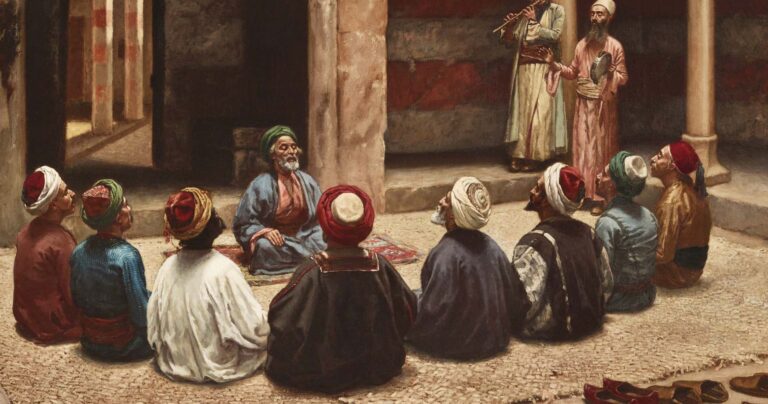In Islam, leadership is a ware, not a goal. Leadership is a means to achieve certain goals that can only be achieved in congregation (Al Imamah Al ‘Udhma, 79).
As explained by Ibn Taimiyah Rahimahullah, these objectives are to enjoin good and forbid evil, improving human affairs in the world and the hereafter so that their lives can be beneficial and safe. (Al Hisbah, Ibn Taimiyah, p. 14).
Every Muslim is obliged to try to improve his religious affairs. In addition, in fard kifayah, Muslims play a role in improving the religion of others according to their capacity in the form of da’wah, jihad, enjoining good and forbiding evil,and other fields.
In the context of leadership, the responsibility of government leaders (Umara) to improve Islamic religious affairs is greater because they are given the power and authority by Allah Ta’ala to achieve this noble goal.
Also Read: The Forty-Four-Days of Glory: Azerbaijan’s Struggle for Justice and Peace
Ibnul Hamam said, “The upholding of religion can be carried out by means of the provisions that Allah commands either in the form of sincere obedience, reviving sunnah and eliminating bid’ah, so that with that the servant is able to realize Allah Ta’ala’s orders.” (Al Musamirah Syarah Al Musayirah fi ‘Ilm al Kalam by Kamal Ibnul Hamam, page 157).
Upholding religion is done in two ways (Al Imamah al ‘Udhma, Abdullah Ad Dimainin, page 80). First, by preaching and jihad. Second, implementing sharia. For this reason, leaders must strive so that Muslims can learn and practice their religion and improve their world affairs easily.
Three taklif (obligation) conditions
Prophetic treatises are God’s way of giving evidence to mankind so that in the afterlife, there will not be a servant who makes the excuse of not worshiping because he was not given evidence.
Also Read: Palestine Solidarity Month: A Collective Movement for Al-Aqsa and Palestine’s Freedom
{ وَلَوْ أنَآ أھلَكْنَٰھُم بِعَذَابٍ من قَبْلھِمۦ لَقَالوُا۟ رَبَّنَا لَوْلَآ أرْسَلْتَ إلِیْنَا رَسُولًا فَنَتبِعَ ءَایَٰتِكَ مِن قَبْلِ أنَ نذِل وَنَخْزَىٰ }
“And if We had destroyed them with a punishment before him, they would have said, “Our Lord, why did You not send to us a messenger so we could have followed Your verses before we were humiliated and disgraced?” (Thaha: 134).
On that basis, every servant must have an obligation to know Allah’s commands and prohibitions. Government leaders, Ulama and Preachers have a greater obligation to know this because they are given positions and have broader knowledge.
The urgency of preaching is increasingly clear because it is one of the three conditions for the emergence of the imposition of sharia on every servant.
Also Read: Hassan al-Turabi: A Controversial Thinker from Sudan
Sheikh Ramadhan Buthi in his book “Al Jihad fil Islam” mentions that there are three conditions that must be met so that a person is burdened by the Shari’a (deserves to be taken into custody). First, notification of the law. Second, the ability to fulfill sharia. Third, there is freedom to fulfill Allah’s commands or leave them. (Al Jihad fil Islam, Ramadhan Buthi, page 32).
Role of Leaders and Ulama
Based on the three conditions of taklif above, we are aware of our important role because as government leaders and scholars cannot create these three pre-conditions (conditions) of taklif without our help by actively contributing in implementing policies for fostering the people (religion & the world).
All parties must believe that the development of the ummah is a shared responsibility and in the hereafter, Allah will question this responsibility.
Also Read: Who Exactly is the RSF Group Shaking Sudan?
عن معقل بن يسار قال: سمعت رسول الله ﷺ يقول: “ما من عبد يسترعيه الله رعية يموت يوم يموت وهو غاش لرعيته إلا حرم الله عليه الجنه“ قيه الجنة.
From Ma’qil Bin Yasâr radhiyallahu anhu said, I heard Rasûlullâh sallallahu ‘alaihi wa sallam say, “No servant has been given the mandate by Allah to lead his subordinates who on the day of his death he still cheats or deceives his people, but Allah forbids heaven on it.” [Muttafaq alaih]
Therefore, this great responsibility must be taken seriously.
Patience and Tawakkal
Also Read: The Two-State Solution (Palestine–Israel) in Historical Perspective
There are always problems in carrying out the mandate and achieving goals. However, every problem contains wisdom and to achieve that wisdom, we must be patient in obedience to Him.
In order for Allah to make it easier for us to face His trials, we must surrender to Allah after trying. There are several things that we must realize in order to fully surrender to Allah,
First, realize that our job is just to try. However, the result of the effort depends on God’s decision.
{قلُْ إنَّ ٱلْأمَْرَ كُلَّهُ لله}
Also Read: Enchanted by K-Dramas, Dragged into Slander: Time for Muslims to Rise!
Say, “Indeed, the matter belongs completely to Allah.”(Ali Imran: 154)
Second, realizing that the test that God gives does not exceed our ability so we must always be optimistic and try our best.
{لَا یُكَلِّ فُ اللهُ نَفْسًا إلَِّا وُسْعَھَا}
“Allah does not charge a soul except [with that within] its capacity..” (Al Baqarah: 286)
Also Read: Creating Opportunity and Avoiding Misery; Lesson Learn on Waste Recycling Issue
Third, realize that we are weak and have many shortcomings. All powers and abilities belong to Allah and only He can make us able to do something.
“Allah wants to lighten your burdens, for man was created weak..” (An Nisa: 28)
Fourth, realizing the importance of husnudzan to Allah. Allah is so perfect that all His decisions made by Him are the best for our world and hereafter.
From Abu Hurairah radhiyallahu anhu, Rasulullah shallallahu alaihi wa sallam said,
Also Read: Between the Treaty of Hudaybiyyah and Ceasefire in Gaza
حسن الظن با من حسن العبادة
“Being faithful to Allah is one of the goodness of worship.” (Narrated by Abu Dawud).
Uniting the people is Allah’s business. Our duty is to fulfill His commandments, to strive to unite. And we have to do that together.
Wallahu a’lam bis showab
Also Read: Peace Cannot Be Achieved Without a Palestinian State
References:
Al Imamah Al ‘Udhma, Abdullah Ad Dumaiji, Daar Al Thayyib, Riyadh, Arab Saudi.
Al Jihad di Sabilillah, Syeikh Ramadhan Al Buthi, Daarul Fikr Al Mu’ashir, Lebanon.
Al Musamirah Syarah Al Musayirah fi ‘Ilm al Kalam, Kamal Ibnul Hamam, Mathba’ah As Sa’adah Mesir
Also Read: Facing the Wall: Netanyahu and Ambitions Built on Blood
Al Hisbah, Ibnu Taimiyah, Daar Al Sya’b. (T/ri/RE1)
Mi’raj News Agency (MINA)





































 Mina Indonesia
Mina Indonesia Mina Arabic
Mina Arabic